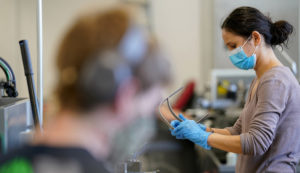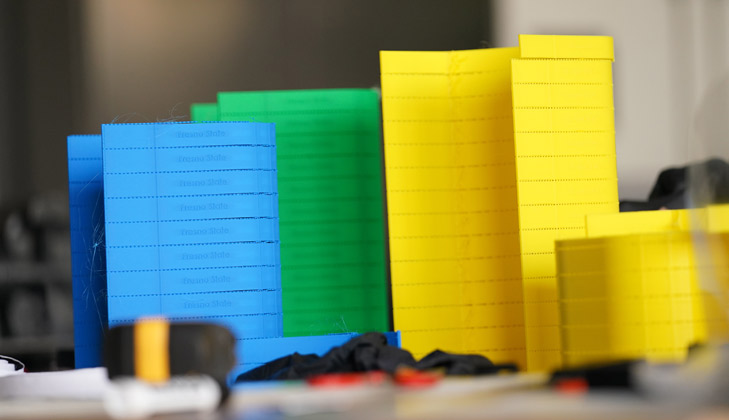A group of engineering students, faculty and alumni from Fresno State’s Lyles College of Engineering have been working up to 10 hours a day in recent weeks to design and produce personal protective equipment (PPE) for Valley health care workers. They plan to donate about 1,000 face shields to Community Regional Medical Center in downtown Fresno as well as other facilities.
Last week during Fresno State’s spring break, the team completed the final design and began production of the face shields — the first part of a three-phase, innovative project to support the community at a time when protective equipment is scarce for doctors, nurses and other health care providers.

“The second phase includes rapid prototyping and testing of an FDA-approved mask and the third phase includes powered air purifying respirators (PAPRs),” said Dr. Ram Nunna, dean of the Lyles College. “If time, complexity and resources allow, they will begin work on mechanical ventilator prototypes.”
Dr. John McClain, a pulmonary critical care fellow, and Dr. Eric Day, a second-year internal medicine resident with UCSF Fresno, a major branch of the UCSF School of Medicine located on the Community Regional Medical Center campus, contacted the Lyles College in March to discuss the anticipated need for custom-designed PPE.
“We need protective equipment that is cheap to manufacture and designed to meet the needs of our doctors, nurses and other allied health professionals while caring for patients during the coronavirus pandemic,” Day said. “We already have a critical shortage of providers in the Central Valley, so we are obligated to give our workers maximal protection to prevent exposure and illness.”
During the testing phases, Day took several different prototypes to Community Regional, where nurses and physicians in the intensive care unit wore the face shields for several hours to test the comfort. Students worked to refine the face shields for both comfort, sanitation and re-use.
The final design was developed by Shervin Zoghi, a 2017 mechanical engineering alumnus, with the help of several Fresno State students. The design is made of 3-D printed plastic, transparency film and Velcro. Both the frame and Velcro can be sanitized for re-use. The shield is made of transparency film, which is inexpensive and can be disposed of or sanitized after each use. A new shield can be easily loaded onto the frame.
“Shervin was the undergraduate Dean’s Medalist for the Lyles College of Engineering in 2017. His great entrepreneurial spirit, dedication to service and community and willingness to bring people together really made an impact in this project,” Nunna said. “He, along with support from our graduate and undergraduate students, Mandeep Singh, Saule Bomar, Noah Haworth, Timofey Volkov, Anderson Medina Guerrero and Jaklin Rowley, made a great design. As for Dr. Day, he might as well be MacGyver. He enjoys experimenting with technology and coming up with innovative ideas using parts from various systems, and has been an excellent collaborator.”
The team plans to donate about 200 face shields this week to Community Regional and surrounding clinics, and will eventually produce about 1,000 in hopes it will help keep the region’s health care providers healthy.
“For a nurse in the medical ICU who is taking care of a COVID-positive patient, they could probably go through as many as 10 face shields in a 12-hour shift,” Day said. “We need as many as we can get.”
Nunna said each face shield costs about $1.50 to produce, and the mask and PAPR units would cost more. Fresno State President Joseph I. Castro and technology firm DPS Telecom, under CEO Bob Berry, provided funds for all the materials used. The 3-D printers were collected from the Lyles College of Engineering, Henry Madden Library, Lyles Center for Innovation and Entrepreneurship and technology firm Five Microns, and were pooled for the manufacturing of the shields.
“We were able to access cost-efficient, existing materials. These materials combined with donated 3-D printers and simple machining have allowed our students to design and produce low-cost, quick turnaround PPE,” Nunna said.
In addition to affordability and comfort, the face shield is produced in a stackable design that aids in production efficiency – cutting production time by 15% to 20%. Civil engineering senior and project team-member Jaklin Rowley said the use of advanced technology like 3-D printers have made it possible to share design files and send them to anyone with a 3-D printer.
“This creates a unique situation for people all over to ‘hive’ manufacture a product that can greatly help the community,” Rowley said. “It is through technology that we have been able to stay connected through this pandemic. People from all over have learned to communicate and innovate from remote places. Without modern-day technology, the extraordinary community response to create these face shields would not have been so easily possible.”
The design is available for anyone with a 3-D printer to print from the open source website.
“This experience is invaluable. This project has allowed students to apply knowledge obtained from their education at Fresno State to real-world problems, work as a team with other disciplines and under tight time constraints,” Nunna said. “Students are interested in making an impact on the world, and this work enables them to do so.”
The Lyles College offers six nationally accredited undergraduate degree programs in civil, electrical, computer, geomatics and mechanical engineering as well as construction management. Graduate degrees include construction management, civil engineering and civil engineering with options in water resources engineering and environmental engineering as well as engineering with options in electrical, computer and mechanical engineering. In May, more than 200 engineering and construction management undergraduate students will earn their bachelor’s degrees and 48 students will earn their graduate degrees.
The CSU Board of Trustees recently gave approval for the Lyles College to begin the formal design of a new bachelor’s degree program in biomedical engineering. Nunna said the program should be available for student enrollment by fall 2022.





